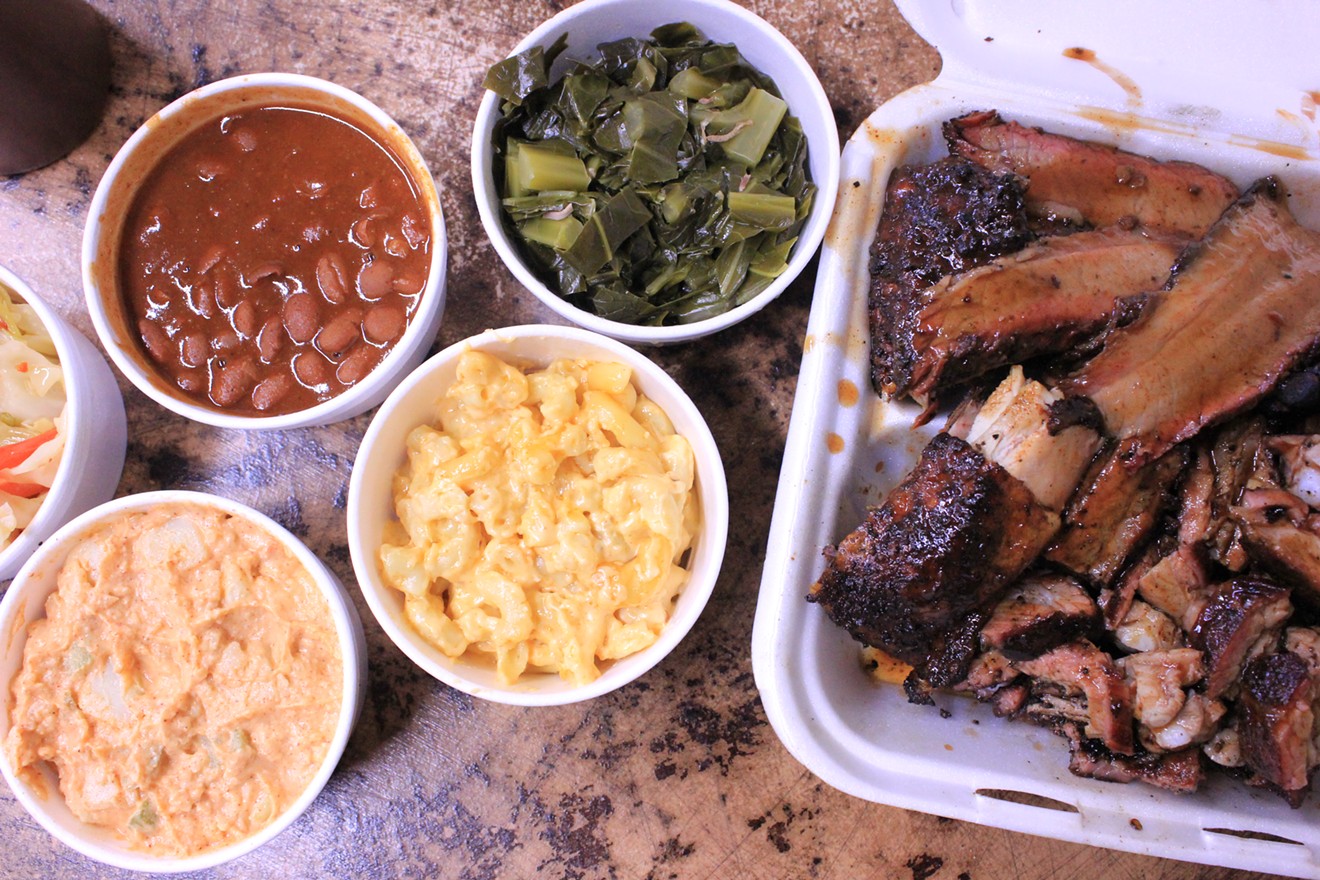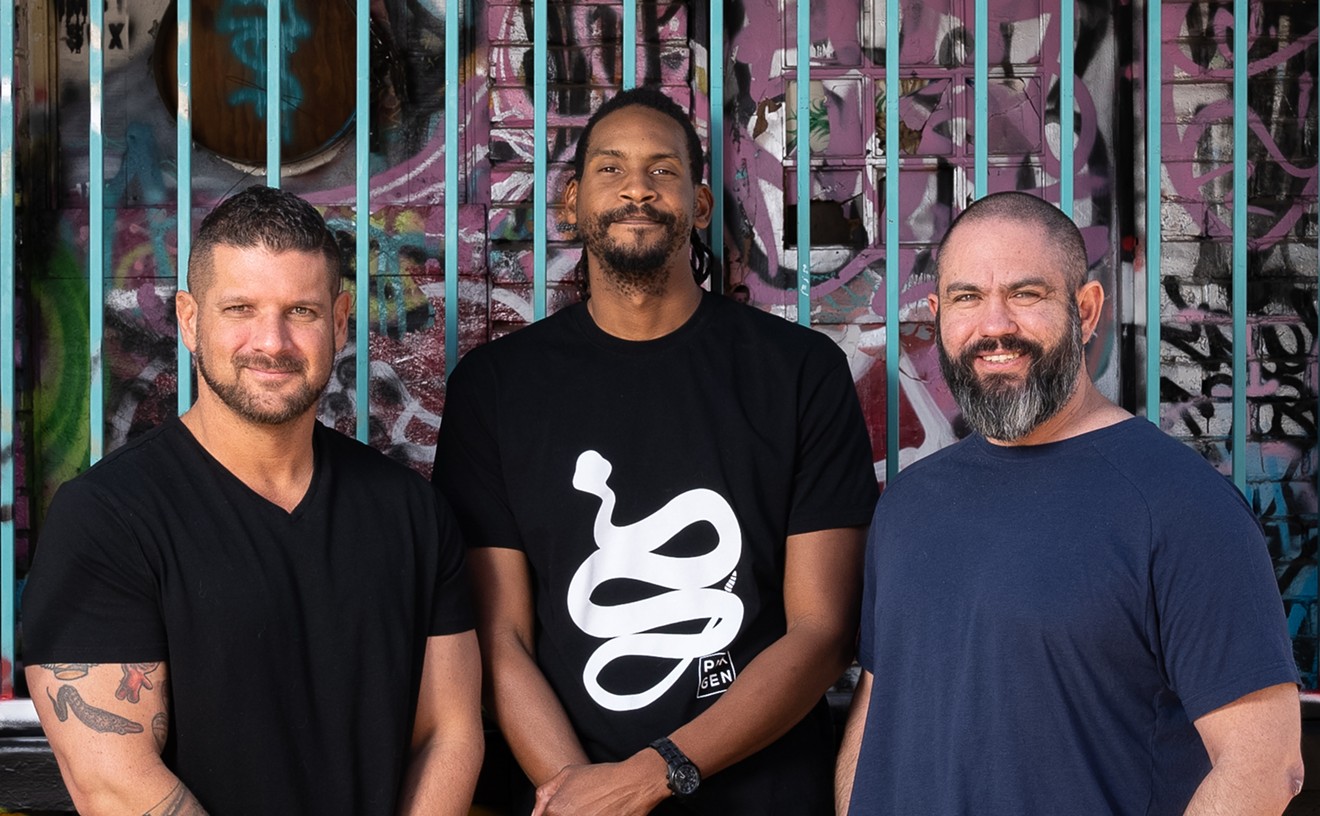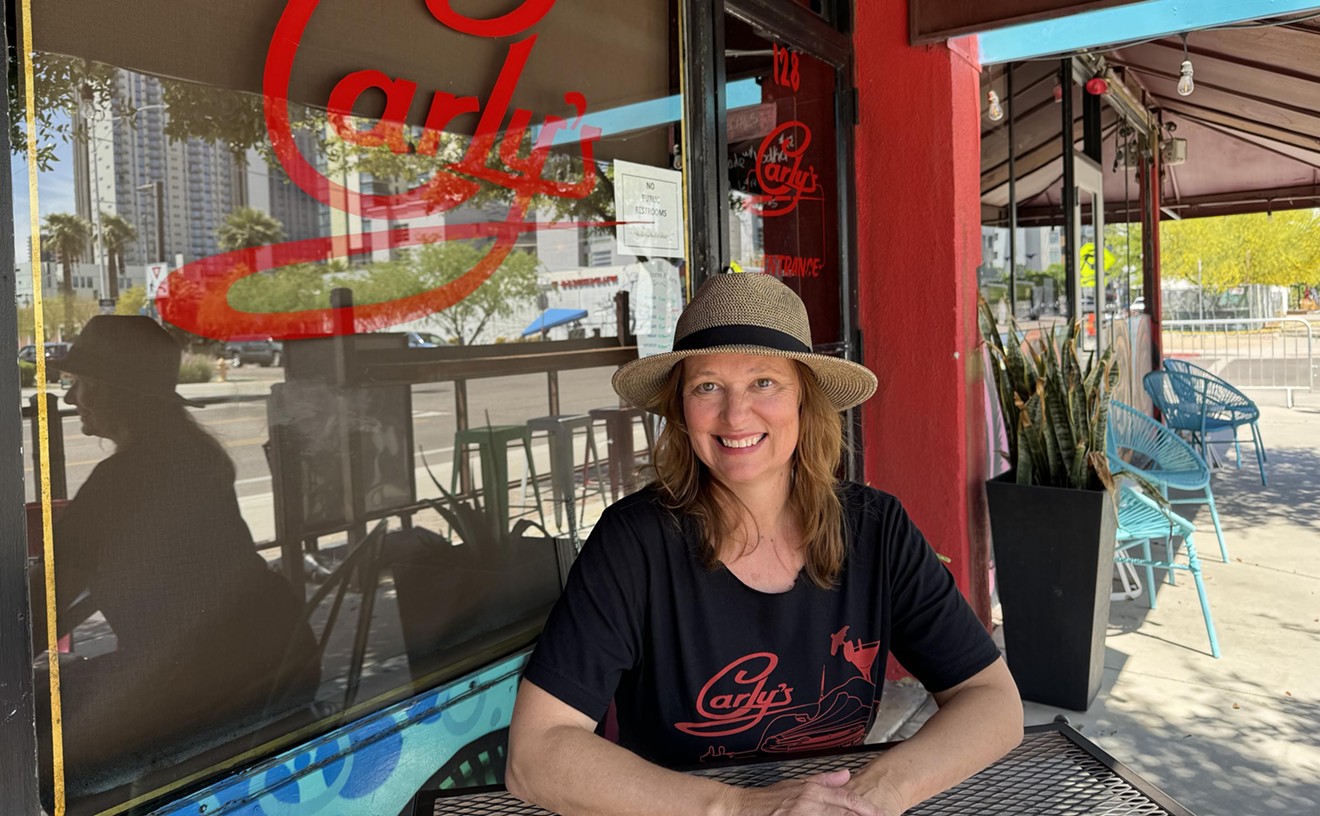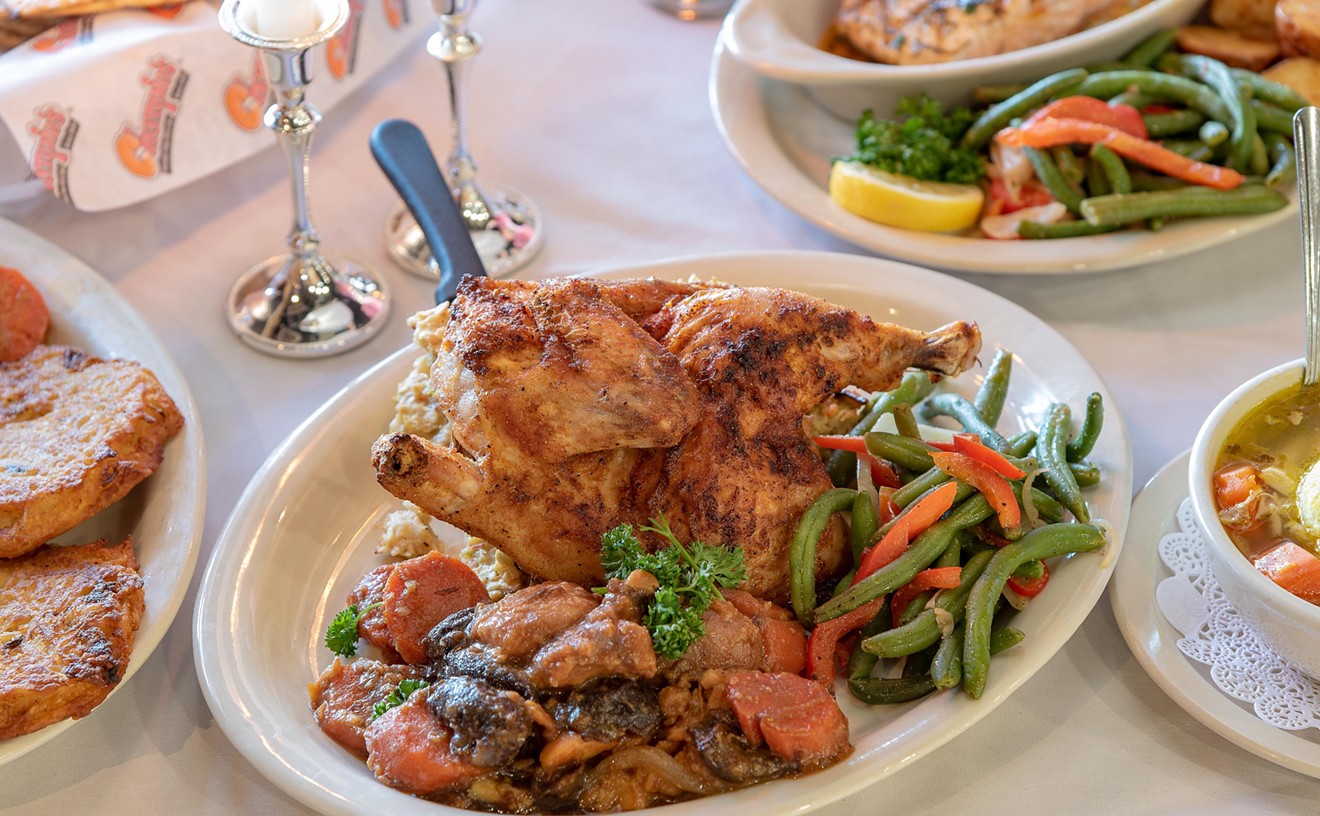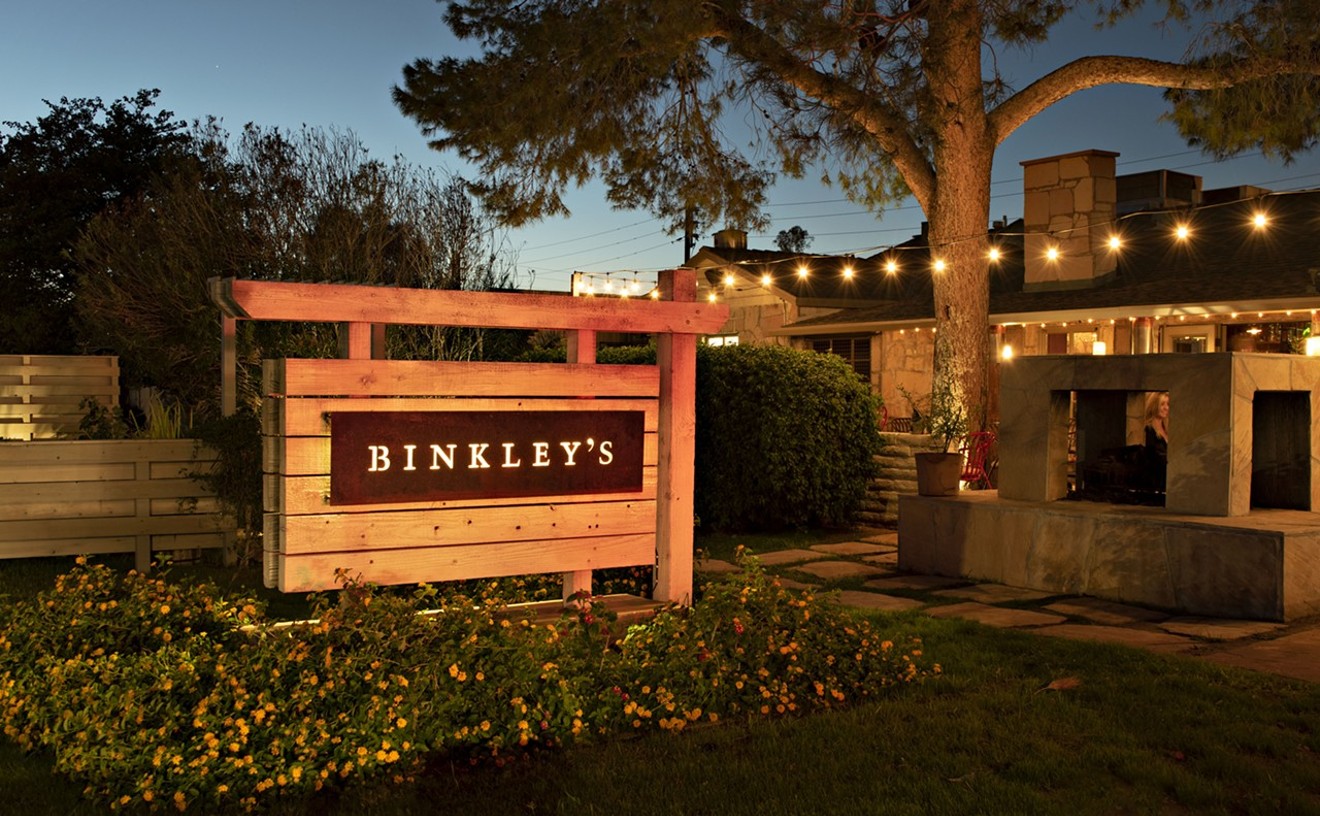“I got the best pulled pork in the country,” says James Lewis. It’s one of many bold claims he makes. He might offer a kindred boast about his brisket, pulling a cooked slab from the Igloo cooler he uses as a warming box, ready to carve off the first slice. And he might talk a similarly big game as he buns Chicago-style sausage, drizzles barbecue sauce, or wields a log of smoked bologna.
When he does, his lively voice seems to roll back onto itself like a wave. Motion ripples through his large frame, animates his words. You almost believe him before you’ve even eaten a single barbecue bean.
How much of Lewis’s talk is talk, and how much is truth?
Lewis runs JL Smokehouse, a year-old barbecue joint in south Phoenix. The place has little more decor than a phone booth. Lewis keeps four tables, some 16 seats total. A chaos of black-marker messages scrawled by customers covers the walls, most praising Lewis' barbecue chops.
“Best BBQ in Arizona.”
“Dem Greens!”
“Bubba Chuck was Chea.”
“Delicious_Glad I came.”
Cooks bustle in a kitchen that occupies half the room. The menu is behind the register. Meats include pulled pork, brisket, ribs, rib tips, links, chicken, and smoked bologna.
Smoked bologna begins as a log the diameter of a coaster. Lewis smokes the meat over mesquite and oak, lets the meat rest, and then cuts it into slabs grilled to-order. The screaming hot pink rounds have a fluid texture like pâté. They pack so much fat that, biting in, you can almost feel your heart tremble. “All down in Memphis, you can’t go to a barbecue place without having barbecue bologna,” Lewis says.
Lewis isn’t from Tennessee. He’s from Marvell, Arkansas. He grew up in a sharecropping family of eight kids. “We raised hogs for quite some time,” he says. “Down on the farm, we chopped cotton. There was wheat and beans. It was a real farm.”
Over his life, three events have shaped the way he barbecues.
First, Lewis grew up in the heartland of smoked meat. “The spirit of barbecue is in Arkansas, down where we come from,” Lewis says. In a way, smoke was in his blood.
Second, a platter of chopped pork put the barbecue madness in Lewis’s soul. “I had Payne’s barbecue in Memphis, Tennessee,” he says. “That put a taste in my mouth that was different from anything I’d ever had. I found myself searching for that taste.”
Third, the madness rife, Lewis came upon Planet Barbecue, a tome by barbecue sensei Steven Raichlen. The instructive, wide-ranging book delves into barbecue cultures across borders and oceans, providing methods, tips, and plenty of recipes.
“The barbecue spirit was put into me from back home,” Lewis says. “After I got the book and everything, it just kind of tapped into what was already there.”
Lewis then went full-tilt into barbecue. The style he ultimately developed blends traditions in ways impossible to untangle. The strongest influence is probably Tennessee; the object of his search was the flavor of the meal he had had at Payne’s in Memphis. By the time he started selling barbecue out of a mobile unit in Scottsdale, the search had ended. After five years of tinkering, Lewis had finally captured the elusive flavor in his sauce.
The sauce is Tennessee-style. It doesn’t lean too far in any one direction: sweet, tangy, tomatoey, or elsewhere. Lewis sauces meats before serving. His sauce, therefore, laces even the “best pulled pork in the country.”
Lewis takes a vaguely renegade approach to smoking meat. He uses two offset smokers, each welded in Arkansas. They are freestanding smokers with half-inch steel walls, and heavy doors opening skyward from squat, compact bodies. Old bits of bark and char cake the top of one smoker’s wheel well, covering the metal like sand covers a beach.
“We do not believe in that whole thing low and slow,” Lewis says of his style. “I say high, then low and slow.”
Following this method, Lewis builds a fire that fills his smoker with 400 to 450 degrees of heat. He lets meats smoke at blazing temperatures for up to four hours. He then lets the fire dwindle some, cooling the chamber for the rest of the long cook.
Lewis, too, takes a hardcore stance on rub. “A rub does not take the place of salt and pepper, and it never will,” he says. He heavily salts and peppers his meats, using a brown-sugar-based rub with a careful hand.
The pork gets this high-then-low and salt-heavy treatment. Lewis pulls his pork by hand. He laments poor souls who machine-pull, which results in “minced baby food.” At JL Smokehouse, pulling pork to order is sacrament. Doing so, Lewis ardently believes, retains juices and prevents dryness. “Take your meat off your bones and see how long you last,” Lewis says.
His pulled pork is dusky and succulent, with large shards that just collapse. Best in the country? Hard to say. I haven't had every pulled pork in the country, and, yet, it's hard to imagine how Lewis' pork could be any better.
A better barometer for barbecue prowess is brisket, and fatty brisket in particular. The ceiling for pulled pork is thousands of feet below the open sky for brisket, a meat that, at the upper end of its range, has about five escalating tiers of mindblowing.
Lewis’ brisket is very good. The modesty of his surroundings — that Igloo cooler, the dusty, half-covered backyard with spilled cords of oak and mesquite — seems to seep into his meat. His brisket has hot buttery dissolve and an endearing abrasiveness, the punch of mesquite and ample black pepper, aggressive flavors where less brash joints might try to pull back and showcase the complexity of the meat (in the voguish central Texan style), the finer points and filigrees.
Lewis comes from a different world. And coming from a different world, he does things differently.
One of the best things to eat at JL Smokehouse is a Chicago-style hot dog. Unlike most, he doesn’t put a light smoke on his links. He goes full bore and builds a small ash bomb, the smoky flavor smoldering in your mouth and fading to nothing slowly, like a song. With cabbage, celery, and peppers, with chile flakes and a cloud-soft roll, this sandwich is pure glory.
Rib tips are one of Lewis’s standouts, delicious in a humble way, and by far the most rustic menu item. They are mildly fragrant, glazed with sauce, and loaded with knobs of cartilage — all part of the experience. Lewis ate rib tips back in his sharecropping days. Throwaway cuts like rib tips were tossed to poorer folks like him. Through barbecue, through the alchemy of smoke and fire, talented cooks made tough meats melt.
This is the spirit and history of barbecue. Taking unwanted meats and making them edible is barbecue’s genesis. The workmanlike past of American barbecue is present in Lewis’s style — the bold flavors, the robust smoke, the style oozing from a man happy to have good food to cook and serve to people. At a time when so much barbecue is about restraint and formula, Phoenix is lucky to have a guy like Lewis kicking it, talking a huge game, and cooking for us in his modest backyard.
Barbecue Joint(s): JL Smokehouse
Smoke Master: James Lewis
Wood: Oak and mesquite
Highlights: Chicago sausage sandwich (Alene), brisket, pulled pork, rib tips
Notable Specials: N/A
Quirk: Lewis makes sides that are actually worth eating. Check out his coleslaw, potato salad, mac and cheese (goosed with smoked gouda), and beans (flavor halfway between barbecue and Cajun). Also, you may want to order your sauce on the side so you can glean more of the meat's character.
Contact/Hours: 1712 East Broadway Road; 501-353-6844.
Tuesday to Friday 11 a.m. to 6 p.m.; Saturday 11 a.m. to 4 p.m.; closed Sunday and Monday.
[
{
"name": "Air - MediumRectangle - Inline Content - Mobile Display Size",
"component": "18478561",
"insertPoint": "2",
"requiredCountToDisplay": "2"
},{
"name": "Editor Picks",
"component": "16759093",
"insertPoint": "4",
"requiredCountToDisplay": "1"
},{
"name": "Inline Links",
"component": "17980324",
"insertPoint": "8th",
"startingPoint": 8,
"requiredCountToDisplay": "7",
"maxInsertions": 25
},{
"name": "Air - MediumRectangle - Combo - Inline Content",
"component": "16759092",
"insertPoint": "8th",
"startingPoint": 8,
"requiredCountToDisplay": "7",
"maxInsertions": 25
},{
"name": "Inline Links",
"component": "17980324",
"insertPoint": "8th",
"startingPoint": 12,
"requiredCountToDisplay": "11",
"maxInsertions": 24
},{
"name": "Air - Leaderboard Tower - Combo - Inline Content",
"component": "16759094",
"insertPoint": "8th",
"startingPoint": 12,
"requiredCountToDisplay": "11",
"maxInsertions": 24
}
]

